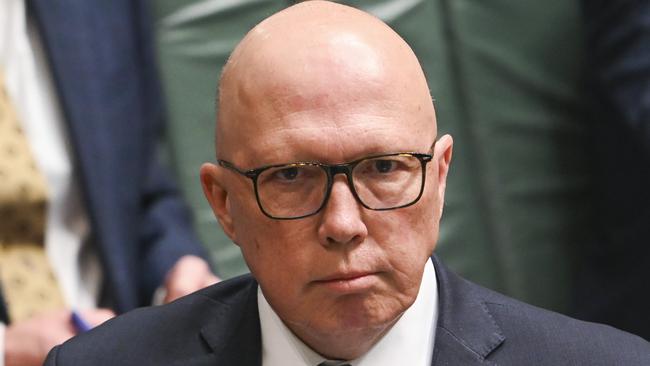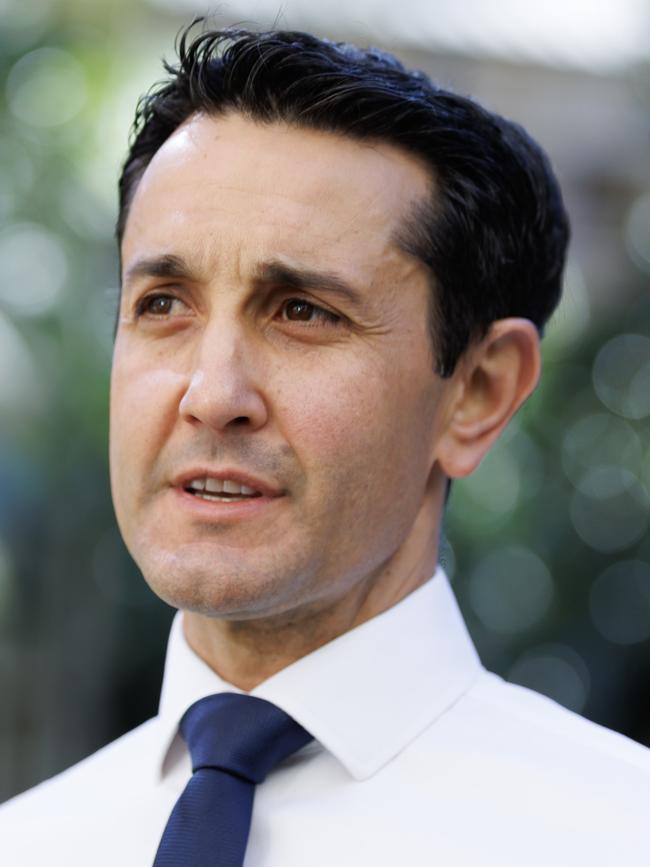Queensland Liberal leader David Crisafulli says nuclear is not part of his plan
The long-running climate wars in the Coalition have erupted, with Queensland LNP leader David Crisafulli ruling out lifting the state’s nuclear ban.

The long-running climate wars in the Coalition have erupted with the most senior moderate Liberal, Simon Birmingham, slapping down David Littleproud’s claim the parties will avoid large-scale renewables and Queensland LNP leader David Crisafulli ruling out lifting the state’s nuclear ban if he wins the election in October.
The divisions emerged as Peter Dutton rejected Labor’s proposed Illawarra offshore wind zone – located 20km off the Wollongong coastline in the marginal NSW electorate of Gilmore – declaring the Coalition won’t support the project.
Mr Dutton made the offshore wind zone an election issue a day after Mr Littleproud, the Nationals leader, said the Coalition would look at alternative energy sources so it didn’t have to pursue large-scale renewables “full stop”.
But Senator Birmingham, the opposition’s foreign affairs spokesman, said there was “absolutely a place for large-scale renewables” as part of the Coalition’s technology agnostic approach.
“It’s an important part of the mix that will help us to reduce our emissions over time. And we’ve then got to be clear that there will be difficult discussions and decisions on that journey to net zero. We’ve been having them in relation to nuclear energy. The Albanese government has stuck its head in the sand,” Senator Birmingham told Sky News.

Defying Mr Dutton’s embrace of nuclear energy, Mr Crisafulli said he wouldn’t repeal state legislation banning nuclear if approached by the leadership of a future Coalition government.
“The answer is no, and I’ve made my views very clear on that, and contrary to some of the most childish memes I’ve seen getting around social media from the Labor Party,” he said.
Mr Crisafulli said it was not the LNP’s “plan, it’s not on our agenda, because quite frankly that’s a matter for Canberra”.
Visiting the NSW south coast town of Bomaderry with Liberal Gilmore candidate and former state minister Andrew Constance, Mr Dutton said the Coalition was listening to community concerns about the 1022sq km Illawarra offshore wind zone.
“It’s clear that the project shouldn’t go ahead. And if you vote for Labor at the next election, the project will go ahead. If you vote for the Coalition, then we will not have it as part of our policy and there’ll be a very big difference between the two parties on that issue and many others before the election,” the Opposition Leader said.
He also launched a staunch defence of small modular nuclear reactors, saying the waste they generated each year was equivalent to a can of Coke and UK Labour was promising more of the energy because there hadn’t been enough baseload nuclear power in their system.
Climate Change and Energy Minister Chris Bowen said Mr Dutton couldn’t bring his partyroom together “with a positive plan for the future, so instead he’s trying to divide Australians with an Abbott-style reheat of long-settled climate change culture wars”.
“Just as Barnaby Joyce did, David Littleproud is dictating the Liberals’ policy once again, and he’s writing what should be serious policy for the Coalition on the fly,” Mr Bowen said.
“Peter Dutton is throwing away the chance for Australians to benefit from tens of billions in new money coming into Australia to develop this industry. Peter Dutton is fine with no new jobs, no new local manufacturing, no new homes, no future, as long as it keeps his deputy happy.”
A 2023 PricewaterhouseCoopers report into offshore wind found the energy source was expected to add $40bn to GDP between 2027 and 2040, supporting 19,000 jobs in the peak of construction and 7000 to 14,000 operational roles in regional areas.
According to International Energy Agency estimates, 17.5 gigawatts of offshore wind will be added to global capacity in 2024 compared with around 8.5GW of gross nuclear capacity.
Across a five-year timeframe, 140GW of global offshore wind capacity is forecast to be added compared with 50.5GW of gross nuclear capacity.
On Tuesday Fortescue boss Andrew Forrest lashed the lack of certainty created by the Coalition’s refusal to take a 2030 or 2035 emissions reduction target to the election.
“If we flip-flop between policies, if we go back to the past of uncertainty then it of course makes employing people and investing very difficult to impossible,” he told ABC radio.



To join the conversation, please log in. Don't have an account? Register
Join the conversation, you are commenting as Logout